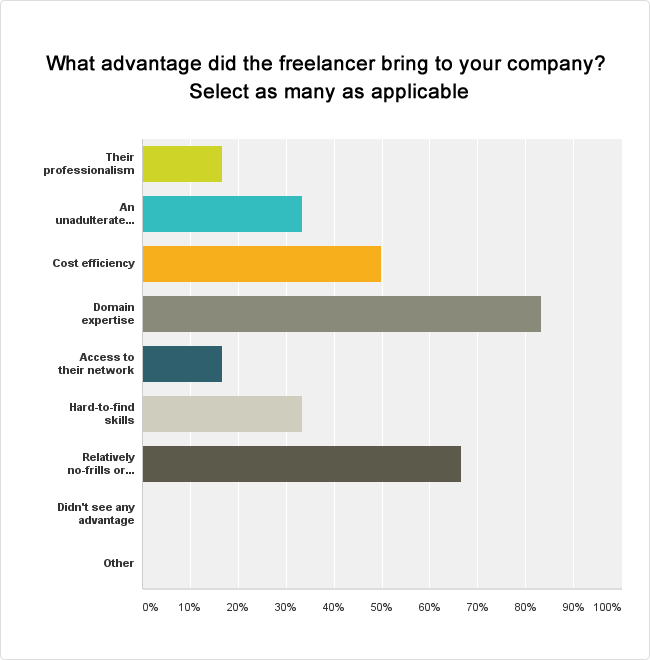Written by: J. Ramanand
22/04/2014
7 minutes read
![eye]() 82
82
![share]() 0shares
0shares
Experienced freelancers often bring high degrees of professionalism and maturity to their work, resulting in quicker turn-around times with high quality. Some of the popular roles that start-ups look for freelancers are in technology development and consulting, business strategy, marketing, social media management, creative services, and in finance and HR.
How good are freelancers? It is a myth that freelancers aren’t among the best in the business – for instance, over half of Flexing It’s registered pool of freelancers are from the top colleges in India and overseas and come with deep expertise. Several freelancers only go independent when they have the confidence that their work is good enough to sustain themselves outside a conventional corporate framework.
- Economy
A constant worry for any start-up is making great hires and matching their financial expectations. Independent workers can be a solution to this problem: for several skills, you can get freelancers who do the job as well, at relatively no overheads. They have their own workplaces, bring their own tools, and financial negotiations are relatively straightforward. Typically, you pay for what you get, and you ask only when you need something.
Many freelancers, being lean and independent operatives themselves, also tend to price their work competitively.
- Plug and Play
A start-up’s life is a tale of shifting priorities and landscapes: seldom is one quarter like another. Many start-ups cannot afford to have specialists on their payroll if their needs are limited to specific phases. For instance, you don’t need that full-time website designer once things are on relative auto-pilot. Alternatively, you may need a short-term burst of analytics expertise to help you organize and make sense of rich customer data.
Freelancers can be plugged into these phases when required. They can be a source of exceptional flexibility for short-term roles without bringing the overheads of employment, for which you have no time. They bring in exposure to key skills and a short-cut to experience. Perhaps you will learn in time how to do digital marketing, but watching someone do it for you (especially when you are paying for it!) may accelerate the process.
- Outside-in
An underrated aspect of working with independent partners is their outside-in approach. While you eat, drink, dream (despite no sleep!), and live your start-up, freelancers can provide a welcome dose of dispassionate thinking and new ideas. They can give you unemotional advice, especially when you’ve missed something obvious. They end up being your pre-alpha testers, having to understand what you are doing and having to try out your product or service. This works best when your freelancer is more of a responsible partner and not merely a fly-by-night vendor.
Passionate ideas often have to be tempered when they collide with the outside world, and your freelancing partner can provide a gentle cushion to help do that.
- Network
Another positive side-effect of working with a freelancer is access to that person’s network. Sociologists talk of the ‘power of weak ties’, where connections to people not especially close to you often turn out to be critical in reaching newer groups of people and in making serendipitous links. Working with newer people, especially from circles very different from your own, enables you to gain access to a wider network of contacts. In the social media age, your freelance network could even help you spread the message out of a sense of partnership and goodwill.
This can only help business.
- Focus
Ever so frequently, people working in a start-up have to ask themselves: how are we spending our time? Could we be doing something else, or doing it better? What should we focus on?
An analysis of one’s time usually shows room for improvement: that time is spent working on activities that you wouldn't consider fundamental but have to be done nevertheless. Or these need skills which you don’t do well right now and hence take too long to get done. Delegation becomes the key, but if you are in a small team, it becomes unfair to overload someone else with your work.
In such a case, it is vital to be ruthless with what your team and you should be doing. It helps to get someone else to do specialized work outside your arsenal of skills – such a developing a talent acquisition strategy or driving a specific analytics module, which will free you up to find your focus again. And let you work on what energizes you the most.
- Variety
Finally, opting to work with freelancers can open up a wide variety of choices. Want someone young and enthusiastic? Or perhaps you prefer an old hand who has seen the world? Got creative skills but need a solid business brain? Need that critical industry perspective on your product before you launch? Or suck at PowerPoint and WordPress? Need someone once a day for the next year? Or for 3 months at 8 hours a day? Need someone in Guwahati to conduct some local market research?
Independent and flexible working is a growing trend because a large number of people want to hold the reins of their own professional and personal lives. This is not restricted to young mothers returning to professional lives or college students looking for pocket money. If you can think of who best fits the bill, chances are you are likely to find them. This ranges from mainstream skills, niche service providers, or advisory roles.
In summary
Working with freelancers can provide start-ups with several practical advantages. Of course, as with any form of business relationship, working with independent professionals requires careful communication and the right amount of oversight. Not every experience is uniformly positive. But, as our survey showed, the majority of start-ups would definitely recommend the option of working with a freelance partner.
Agree or disagree? Tell us: our survey for startups is here https://www.surveymonkey.com/s/PB7Q6FR. We welcome your thoughts and experiences.
--
Also read: 5 common myths about working with freelancers http://flexingit.com/blog/start-ups-lever-up-discover-the-power-of-freelancers-34/








 `
`  82
82
 0shares
0shares






